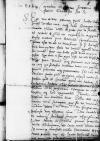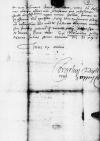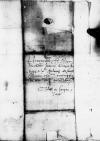Letter #254
Cornelis DE SCHEPPER to Ioannes DANTISCUSPlymouth, 1525-07-06
English register:
De Schepper has sent a letter to Dantiscus from the port of Laredo. He has entrusted this letter to Hieronymus Viromandus, secretary to the English ambassador [Richard] Wingfield, but he is not sure that the letter has been passed onf to Dantiscus. De Schepper reaffirms his commitment to Dantiscus. He presents himself as Dantiscus' greatest herald, even though he wants to keep himself far from flattery.
The sea voyage was difficult, due to stormy weather, but De Schepper arrived safely in Plymouth. There he recovered from his seasickness, thanks to his conversations with James Horswell, who is a great admirer of Dantiscus. De Schepper can only be pleased by this, as Dantiscus owes his success to his merits. De Schepper has dealt with the business for which he came to England, be it not with the expected results. He has heard much praise of Dantiscus, especially by James Horswell.
De Schepper wants Dantiscus to know that he has acquired friends everywhere; he urges Dantiscus to recommend James Horswell in his letters, and assures him of his own loyal friendship. He invites Dantiscus not to disappoint his admirers, who consider him a paragon of wisdom and literacy. As he feels free to express himself as a brother, he urges Dantiscus to reciprocate the services rendered to him. De Schepper will ensure that his King [Christian II of Oldenburg] acknowledges the merits of Dantiscus.
Manuscript sources:
Auxiliary sources:
Prints:
| ||||||||||||||||||||||
Text & apparatus & commentary Plain text Text & commentary Text & apparatus
Honorabili et magnifico Domino
Cornelius Duplicius Scepperus Ioanni Dantisco suo salutem.
Salutem.
Ego vero ad te ex
De fortunis meis non est, quod multum ad te perscribam. Navigavi, uti nosti,
Quod ad illustrissimum
Bene vale.
Ex
Tuus ex animo
[1 ] Laredo is situated in the duchy of Cantabria, not in the principality of
[2 6 ] Perhaps De Schepper alludes here to Dantiscus’ poem cf.



